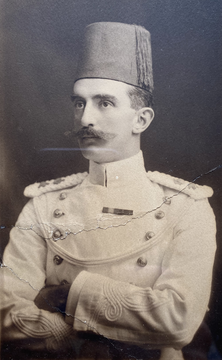DE LANCEY-FORTH, Nowell Barnard
| Service Number: | 19 |
|---|---|
| Enlisted: | Not yet discovered |
| Last Rank: | Sergeant |
| Last Unit: | 4th Queensland Imperial Bushmen |
| Born: | Dwaroon (near Warrnambool), Victoria, Australia , 22 December 1879 |
| Home Town: | Warrnambool, Warrnambool, Victoria |
| Schooling: | Geelong Church of England Grammar School, Victoria, Australia |
| Occupation: | Army officer |
| Died: | Alexandria, Egypt, 5 March 1933, aged 53 years, cause of death not yet discovered |
| Cemetery: | Not yet discovered |
| Memorials: |
Boer War Service
| 1 Oct 1899: | Involvement Private, 19, Queensland Imperial Bushmen | |
|---|---|---|
| 18 May 1900: | Embarked Australian and Colonial Military Forces - Boer War Contingents, Private, 19, 4th Queensland Imperial Bushmen, Embarked on Manchester Port | |
| 19 May 1900: | Promoted Australian and Colonial Military Forces - Boer War Contingents, Sergeant, 4th Queensland Imperial Bushmen, Gazetted to 3rd Battalion, Manchester Regiment in June 1900. | |
| 1 Jul 1901: | Involvement British Forces (All Conflicts), Promoted to Lieutenant in 3rd Battalion, Manchester Regiment. Served with British regular forces until 1906. |
Help us honour Nowell Barnard De Lancey-Forth's service by contributing information, stories, and images so that they can be preserved for future generations.
Add my storyBiography contributed by Tim Hanna
From the Australian Dictionary of Biography, Volume 8
Nowell Barnard de Lancey Forth (1879-1933), soldier, was born on 22 December 1879 at Dwaroon, near Warrnambool, Victoria, son of De Lancey Forth, farmer, and his wife Annie Thompson, née Ware, both native-born. After attending Geelong Church of England Grammar School he enlisted as a private in the 4th (Queensland Imperial Bushmen) Contingent and embarked in the Manchester Port for South Africa on 18 May 1900. Promoted sergeant in June and twice recommended for a commission, he was gazetted to the 3rd Manchester Regiment, British Army, a promotion which was made effective from 19 May. He saw action in the Orange River Colony, and near Pretoria in the Transvaal. After this service which included fierce action at Zilikat's Nek, he was invalided to Australia.
In July 1901 Forth was promoted lieutenant in the Manchester Regiment and in 1901-06 served with the British regular forces. Seconded to the Egyptian Army in March 1907, he spent the next nine and a half years as a member of the Sudan Camel Corps and took part in campaigns in the Jebel Nyiama district in 1908, southern Kordofan in 1910, the Nuba Mountains in 1914 and general operations in the Sudan in 1914-16. Promoted captain in the Manchester Regiment in 1912, he was mentioned in dispatches, attained his majority and was awarded the Military Cross for his service in the Nuba Mountains. In 1917 he commanded the 3rd Battalion, Imperial Camel Corps, and remained with it in Sinai and Palestine, leading it in two particularly notable engagements. In the first, a charge against Tank Redoubt during the 2nd battle of Gaza, he was wounded but continued to direct the fight until the battalion withdrew. On the second occasion his battalion was ordered to protect the right flank of the British 53rd Division at Tel-el-Khuweilfe by occupying a hill after it had been supposedly captured by a British regiment. While leading his troops out before dawn on 6 November 1917 Forth realized that the hill was still held by Turks and that his battalion was isolated and within a few yards of enemy lines. With a quick command he retired his men in perfect order under heavy fire to the cover of a spur, thereby saving them from annihilation. They held on under severe fire all day and through the night and withdrew only after receiving artillery support. For his decisive and courageous action Forth received a Bar to the Distinguished Service Order he had won in a previous engagement.
The 3rd Battalion next held a portion of the line at Auja River before it retired to the Canal Zone for reinforcements. Once up to strength, the battalion returned to Palestine mounted on horses and Forth, now an acting lieutenant-colonel, was transferred in June 1918 to command the 7th Battalion, Essex Regiment, also in Palestine. As well as his M.C., D.S.O. and Bar he also received three mentions in dispatches for his war service. Promoted temporary lieutenant-colonel in December, he was stationed until 1920 at Sollum, on the Egyptian-Cyrenaica frontier, in command of the Western Desert Forces. In April 1920 he was employed by the Egyptian Government as commander of the Camel Corps and Light Car Patrols, Frontiers Districts Administration. Stationed mainly in Cairo he remained in command of this unit until 1924. He was awarded the Order of the Nile, the Order of the Mejidieh and was made a fellow of the Royal Geographical Society for his explorations in the Libyan Desert in search of the lost oasis of Zehzura.
Forth gave distinguished service during his association with the Camel Corps and brought to his command a thorough knowledge of the operation of mounted troops in desert warfare. He maintained close links with the Australians who served under him during the war and was planning to visit Australia when he died at Alexandria, Egypt, on 5 March 1933.
Sourced by Brigadier Tim Hanna












